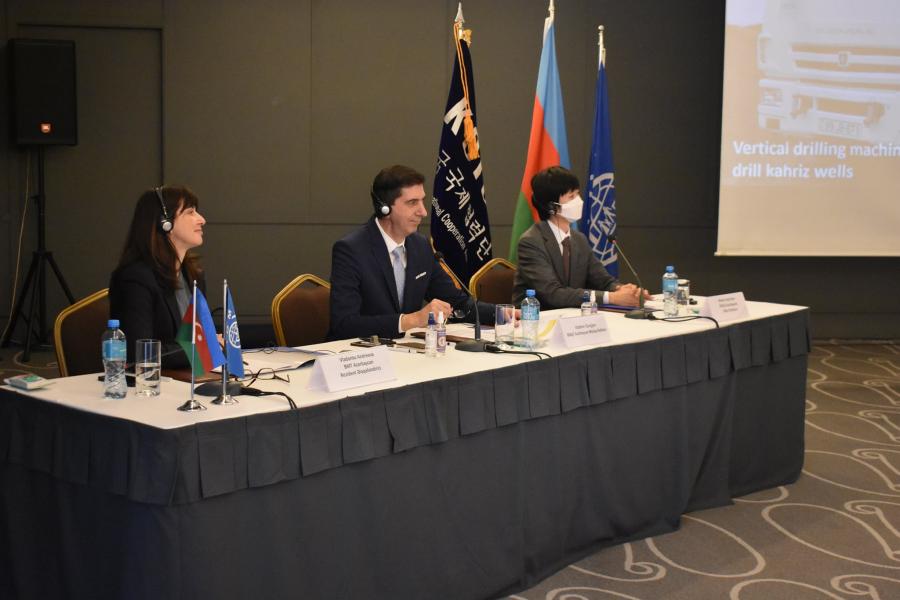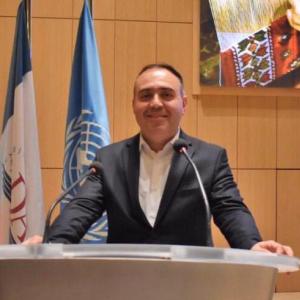IOM Azerbaijan organized a photo exhibition and conference entitled “Kahriz as a source of water and life”
03 December 2021
- On 3 December 2021, IOM Azerbaijan organized a photo exhibition and conference entitled “Kahrizes as a source of water and life” dedicated to the Mission’s “Integrated Rural Development for Internally Displaced Persons (IDP) Communities in Azerbaijan through Revitalization of the Kahriz Water Supply System” project funded by the Korea International Cooperation Agency (KOICA).

Representatives of the Presidential Administration, the Cabinet of Ministers, a number of ministries (Ministry of Economy, Ministry of Ecology and Natural Resources, Ministry of Agriculture, Ministry of Foreign Affairs), and government agencies (State Committee for Affairs of Refugees and Internally Displaced Persons, Melioration and Water Resources OJSC, Azersu OJSC, State Oil Company), UN agencies, embassies, donor and partner organizations, education and civil society organizations, the executive authorities from the project areas, community members, project engineers, and kahriz masters participated in the event.
In their opening remarks, Mr Vladimir Gorjiyev, Chief of IOM Azerbaijan, and Ms Vladanka Andreeva, UN Resident Coordinator in Azerbaijan, and Mr Moon Jong Hyun, Country Director of KOICA welcomed the participants and spoke about the importance of the project of kahriz rehabilitation for people.
In his opening remarks, Vladimir Giorgiyev noted that the selection of the kahriz rehabilitation project as a national winner of the Global Energy Award in 2021, the most prestigious environmental award, shows the significance and importance of this kind of project for people and environmental sustainability.
“With the use of innovative technology, the rehabilitation process of kahrizes has become more effective and secure. This innovative Kahriz rehabilitation technology has great potential and can be used in rehabilitation and construction of new environmental water supply systems even beyond Azerbaijan,” said Vladimir Gjorgjiev, Chief of IOM Azerbaijan.
Ms Vladanka Andreeva said that the kahriz rehabilitation project contributes to Azerbaijan’s efforts to fulfill Sustainable Development Goals and emphasized the importance of rehabilitation of kahrizes for Azerbaijan.
After the opening speeches, a film about the work of innovative technologies used in the rehabilitation of kahrizes was shown, and an exhibition of photos, printed books, and resources reflecting the activities of the project was viewed.
The event included presentations on the current implementation of the project, the Atlas of Kahriz in Azerbaijan in two languages, the National Master Plan on Kahrizes, the Kahriz Information and Research Center, and the Kahriz Engineering course at the ASAU, the speeches of the kankans and community members were heard.
The Kahriz rehabilitation project is one of the most crucial and timely activity undertaken by the IOM in Azerbaijan. The Mission has been rehabilitating kahrizes in Azerbaijan since 1998. Since that time 166 kahrizes in different regions of Azerbaijan were rehabilitated within various projects. Building upon IOM’s successful past experiences and unique expertise, the mission currently is implementing the four-year project with the financial support of KOICA to provide safe and consistent water supplies for peoples in regions through the renovation of kahrizes, a traditional, sustainable water supply system. As previous ones the current project also continues to implement a community-driven approach, paying specific attention to cross-cutting issues such as gender, governance, and environmental sustainability.
The project implemented by IOM Azerbaijan contributes to Azerbaijan’s efforts to fulfill three Sustainable Development Goals (SDG) through the provision of water for domestic and agricultural needs which has a direct impact on poverty reduction and food security (SDG 1), empowering and involving women into the decision-making process, increasing their role in the community in terms of leadership (SDG 5), and the rehabilitation of eco-friendly and sustainable water supply systems, kahrizes and enhanced access to safe drinking water (SDG 6).


